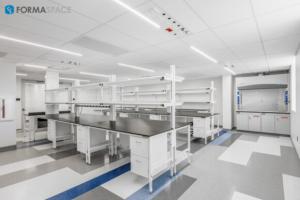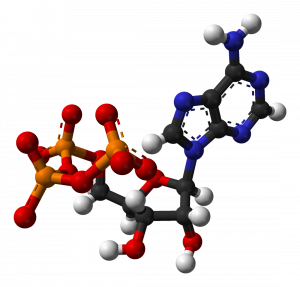The New England Journal of Medicine Claims Post Surgery Drug Therapy Increases Lung Cancer 5-Year Survival Rate to 88%

Looking for new ideas for your next laboratory construction or renovation project? Shown above is a wet lab installation with back-to-back workbenches with integrated utilities and storage systems.
Read about the study that shows Osimertinib can help increase 5-year post-surgery survival rate for patients with Non-Small Cell Lung Cancel.
But this month, there was good news for patients diagnosed with Non-Small Cell Lung Cancer (NSCLC) who harbor the T790M genetic mutation. According to a new article published in the New England Journal of Medicine, AstraZeneca’s drug Osimertinib (marketed under the brand name Tagrisso) can increase the 5-year overall survival rate to 88% among patients with the T790M mutation who have undergone lung surgery to remove NSCLC tumors.
Statistically speaking, this is really good news, but it’s also not immediately obvious exactly which patients can benefit from this clinical therapy.
To understand the scope of the problem, let’s look at relevant statistics for the different types of lung cancer and associated genetic mutations.
Types Of Lung Cancers And Associated Genetic Mutations
The topline statistic is very sobering: lung cancer is a leading cause of cancer death in the US.
According to the American Cancer Society, incidences of lung cancer diagnoses rank just behind breast cancer for women and prostate cancer for men. While it’s not the most common form of cancer (according to the CDC, skin cancer, breast cancer, and prostate cancer are the most common, followed by lung cancer), lung cancer remains by far the deadliest – it is responsible for 1 in 5 cancer deaths.
The American Cancer Society estimates that there will be about 240,000 new lung cancer diagnoses and about 130,000 deaths in 2023.
Demographically, lung cancer is more often diagnosed among older people; the average age of those diagnosed with the disease is 70.
Those with a history of smoking are affected most. Fortunately, the number of new cases is edging downward, a trend that appears to be associated with a broad societal reduction in smoking.
Small Cell Versus Non-Small Cell Lung Cancer (NSCLC)
Oncologists generally divide lung cancer into two categories: small-cell lung cancer (SCLC) and non-small cell lung cancer (NSCLC).
Tissue samples taken during a biopsy can reveal the difference. As the name implies, the size of individual cells associated with small-cell lung cancer is significantly smaller.
SCLC affects fewer patients overall, comprising only about 10-15% of cases. But it’s very aggressive and can spread quickly to many parts of the body, often before it’s diagnosed. SCLC is also more often associated with a history of smoking.
Non-small cell lung cancer (NSCLC) is the more common diagnosis, responsible for 80 – 85% of lung cancers. There are three major types of NSCLC:
· Adenocarcinomas
This is the most common type of lung cancer, responsible for 40% of all cases, and fortunately, it is the most treatable. Adenocarcinomas often form in the peripheral areas of the lung and can spread via the lymph nodes. Adenocarcinomas can be mistaken for a case of pneumonia during a chest X-ray as they often have a similar presentation.
· Squamous Cell Carcinomas
This type of lung cancer is responsible for 25-30% of cases (a lower percentage than in years past). Over time, a Squamous Cell Carcinoma can form a large cavity in the central bronchial area of the lungs.
· Large Cell Carcinomas
Also known as undifferentiated carcinomas, these are relatively uncommon compared to the other types – comprising only 10-15% of all lung cancer diagnoses. Unfortunately, however, Large Cell Carcinomas tend to spread via the lymph nodes to other parts of the body.
The Role Of The T790M Genetic Mutation For Epidermal Growth Factor Receptor (EGFR) In Treating Non-Small Cell Lung Cancer (NSCLC)
The identification of the T790M genetic mutation in lung cancer patients is one of the more significant gene sequencing discoveries in oncology.
The T790M gene mutation, which is present in about one-quarter of patients worldwide, affects the function of the Epidermal Growth Factor Receptor (EGFR).
T790M essentially serves as a “master switch” for Epidermal Growth Factor Receptor by substituting a threonine amino acid in place of a methionine amino acid; this change can allow cancer cells to grow and spread rapidly throughout the body.
What is the specific mechanism that allows this to happen?
This threonine amino acid genetic mutation accelerates the ability of Adenosine triphosphate (ATP) – a major source of “growth energy” throughout the body – to bind to the Epidermal Growth Factor Receptor (EGFR) gene to such an extent that it outcompetes other “inhibitor” amino acids that try to put the brakes on unregulated cell growth.
In other words, with ATP on full throttle, applying the ‘brakes’ using inhibitors is not effective, allowing cancer cells to propagate quickly.
Read more...
Julia Solodovnikova
Formaspace
+1 800-251-1505
email us here
Visit us on social media:
Facebook
Twitter
LinkedIn
Legal Disclaimer:
EIN Presswire provides this news content "as is" without warranty of any kind. We do not accept any responsibility or liability for the accuracy, content, images, videos, licenses, completeness, legality, or reliability of the information contained in this article. If you have any complaints or copyright issues related to this article, kindly contact the author above.


